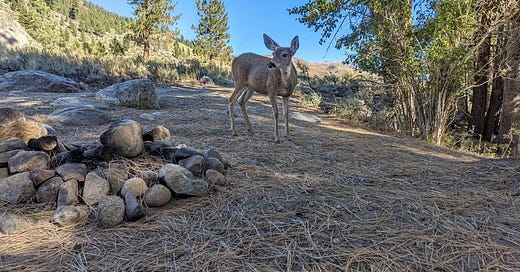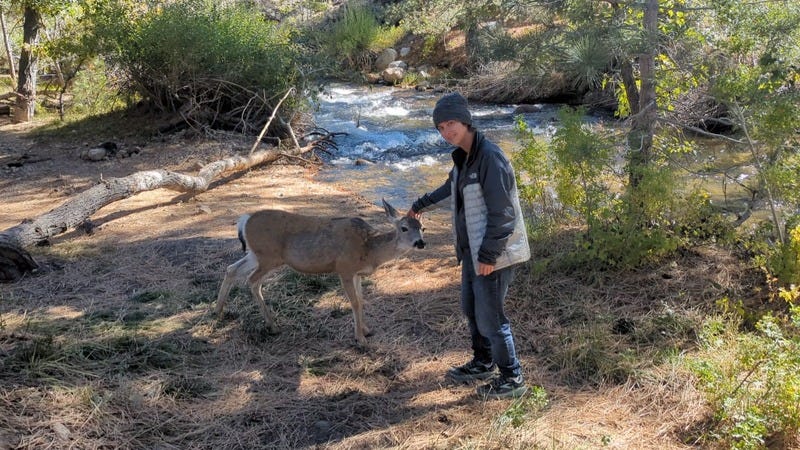Oh, that was a fawn response...
People-pleasing can keep us safer, but is not the only way to defend ourselves
Hi friends,
Last week, I wrote about an email exchange from 15 years ago where I remembered expressing my discomfort with a man who was harassing me, but when I re-read the email thread, I had responded gently and supportively, not sharing that I was uncomfortable or asking him to stop.
Two people responded in the comments to let me know my gentle email replies sounded like a fawn response. I learned about the concept of a fawn response, but hadn’t realized it applied to this behavior. But this totally made sense and helped me understand what had happened on a deeper level.
When we are in stressful or dangerous situations, our animal brain takes over with an instinctual response instead of evaluating the situation and deciding on a logical response.
Fight or flight responses are the most well known, but freeze and fawn responses are also very common. A freeze response means you may not be able to speak or move as a response to stress. A fawn response means you people-please, saying or doing what you think the aggressor wants, agreeing or doing as you have been told in hopes of placating the aggressor, getting out of the situation and reducing the stress.
When I realized how I replied to those emails was a fawn response, I found the concept helpful to better understand why I did what I did. Instead of “I have no idea why I would have responded like that” I understood “I was doing the best I could to help myself feel safer, and a fawn response was how I had learned how to keep myself safe at the time.”
I really appreciate
‘s comment on how patriarchal society trains us to have these kind of fawn responses:One thing that has helped me as I process my past is to learn about threat responses like the fawn response--it is actually a way our bodies/brains keep us safe from predators! Your emotions/memories are real, and your emails sound like a really good example of what fawning looks like.
Patriarchal and hierarchal societies really love the fawn response so many people (especially those socialized as female) are trained to have this type of response (instead of fight/flight/freeze).
The older I get the less I am able to fawn and the more I can engage with other responses like fight (and it feels pretty good!)
This comment resonated with me a lot. I also feel as I have grown older (and trained in the martial art of aikido) that I’ve developed my fight or flight response. Today, I’m more likely to fight or run away as opposed to freeze or fawn, and that feels different than 15 years ago.
D.L. has written an incredibly helpful post, The Fawn Response and CPTSD, going into depth about how the fawn response is used to keep coercive control over people: “The fawn response is the desired threat response for authoritarian parents, religious leaders, and governments.” Fascinating and important stuff—check it out!
The fawn response is quite entwined with gender, I think. Children raised as girls are more likely to be indoctrinated that fawning is the appropriate response to authority (but not just girls, certainly).
Trans and gender non-conforming people can be threatened by people who hope to trigger the fawn response of behaving as their assigned gender at birth. If you feel like you have to wear women’s or men’s clothes or use an old name at a family event when you wouldn’t usually, that could be a fawn response, not wanting to deal with the stress or threats if you show up as your true self.
And that can be okay, if that’s what you need to do to keep yourself safe.
I find it valuable to grow more aware of what kind of responses I have used: fight, flight, freeze, or fawn. I don’t want to judge myself—I am merely observing.
And then perhaps with years of self-defense training and sitting with the awareness of what I do, I may find I fight back more often, or know when to leave a stressful situation, instead of freezing up and not being able to do anything, or fawning and putting other people’s interests above my own.
Thanks so much for reading! Let me know what you think in the comments.
Take care,
Rey









Reyyy!!! I have SO MUCH to say about this. I am actually working on something about my own fawning right now. But I love what you have written here. As always, I love your gentle way of looking at things. Your acceptance and growth. It is such a special and safe space. <3
This is really interesting. I hope that someone who knows more about this can answer a question it's brought up for me: My understanding of fight/flight/freeze responses is that they are an automatic reaction when our sympathetic nervous system engages due to stressors/trauma. We don't have control over which response we use; we all have slightly differing nervous systems, and we can't consciously control our reactions once the sympathetic system is in control. Is that correct? If not, can someone clarify/correct my statement? If it is correct, how is it that we can be trained to fawn instead of fight/fly/freeze? I'm missing something...